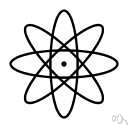atomic theory
Also found in: Thesaurus, Medical, Encyclopedia, Wikipedia.
atomic theory
n.
The physical theory of the composition of matter stating that common materials are composed of molecules, which are composed of atoms, which are composed of nuclei and electrons. It holds that the properties of composite entities, such as their structure and behavior, arise from the properties of their components.
American Heritage® Dictionary of the English Language, Fifth Edition. Copyright © 2016 by Houghton Mifflin Harcourt Publishing Company. Published by Houghton Mifflin Harcourt Publishing Company. All rights reserved.
atomic theory
n
1. (Atomic Physics) any theory in which matter is regarded as consisting of atoms, esp that proposed by John Dalton postulating that elements are composed of atoms that can combine in definite proportions to form compounds
2. (Atomic Physics) the current concept of the atom as an entity with a definite structure. See atomic structure
Collins English Dictionary – Complete and Unabridged, 12th Edition 2014 © HarperCollins Publishers 1991, 1994, 1998, 2000, 2003, 2006, 2007, 2009, 2011, 2014
ThesaurusAntonymsRelated WordsSynonymsLegend:
Switch to new thesaurus
| Noun | 1. |  atomic theory - a theory of the structure of the atom atomic theory - a theory of the structure of the atomscientific theory - a theory that explains scientific observations; "scientific theories must be falsifiable" atomic physics, nuclear physics, nucleonics - the branch of physics that studies the internal structure of atomic nuclei Bohr theory - (physics) a theory of atomic structure that combined Rutherford's model with the quantum theory; electrons orbiting a nucleus can only be in certain stationary energy states and light is emitted when electrons jump from one energy state to another Rutherford atom - first modern concept of atomic structure; all of the positive charge and most of the mass of the atom are contained in a compact nucleus; a number of electrons (equal to the atomic number) occupy the rest of the volume of the atom and neutralize the positive charge |
| 2. | atomic theory - (chemistry) any theory in which all matter is composed of tiny discrete finite indivisible indestructible particles; "the ancient Greek philosophers Democritus and Epicurus held atomic theories of the universe" theory - a well-substantiated explanation of some aspect of the natural world; an organized system of accepted knowledge that applies in a variety of circumstances to explain a specific set of phenomena; "theories can incorporate facts and laws and tested hypotheses"; "true in fact and theory" chemical science, chemistry - the science of matter; the branch of the natural sciences dealing with the composition of substances and their properties and reactions |
Based on WordNet 3.0, Farlex clipart collection. © 2003-2012 Princeton University, Farlex Inc.